UN is an international organization created to maintain, establishing security and diplomatic relations around the world. The concept of the organization, its charter began to be developed during the Second World War by the main representatives of the anti-Hitler coalition (53 states).
Occurrence
The first mention of the term "United Nations" was recorded in January 1942 in the Declaration of the United Nations. The signing and approval of the Charter took place at a conference in the American city of San Francisco, which took place in 1945 for three months. Over 50 leading states took part.
Structure
The organization consists of eight parts: the Secretary General at the head of the Secretariat, the UN General Assembly, the Security Council, the Trusteeship Council, the International Court of Justice, the Economic and Social Councils, and special international organizations of a wide profile. All of the above structures fulfill their role in the global community. The UN headquarters is located in New York. The building is located on Manhattan Island. In addition to the UN headquarters, there are additional ones in Geneva, Vienna and Nairobi.
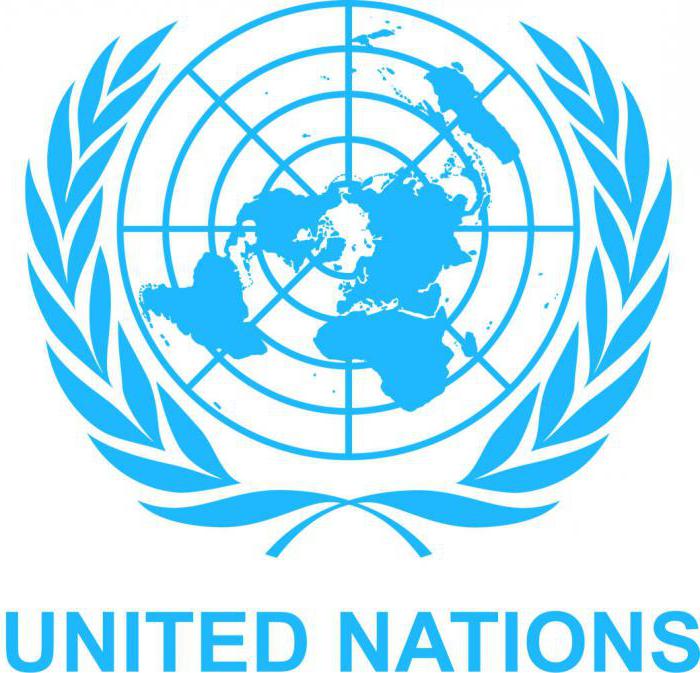
The General Assembly in an organization is a representative body that occupies a central place. The assembly consists of several main governing bodies that deal with the following issues:
- international security and the renunciation of weapons, including nuclear;
- issues of financial and economic activity;
- issues and problems of cultural activity;
- political issues;
- budget issues;
- regulatory and legal sectors.
In addition to the main bodies, two more were created, dealing with organizational issues, the agenda and others. The work of the assembly follows the principle of sessions. The meeting of members is of three types: emergency, regular or special, depending on the type of session. Some meetings can be convened by the Security Council within a day after the decree of the Secretary General of the organization. The Secretary General may be elected for a term of up to five years, and his duties include informing the world community of possible threats.
The Secretariat, headed by the Secretary General, serves as a mediator of international disputes, makes reports on current world social and economic trends. Keeps international treaties and monitors their implementation. The staff of the secretariat is more than 40 thousand people around the world.
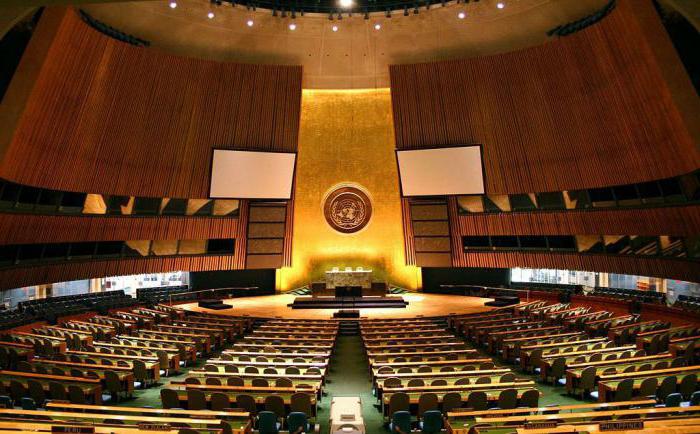
Security Council - an organization that monitors compliance with world security, has the authority to impose or remove sanctions against individual states, and gives the right to hold military or peacekeeping organizations. It consists of permanent members with veto power. These include: the United States, the Russian Federation, China, France, the Kingdom of Great Britain. Additionally, ten countries are re-elected every 2 years.
The International Court of Justice acts as a mediator in resolving issues of territorial integrity, and is also the main consultant to other organizations included in the UN. Judges appoint 15 independent people who are completely neutral with respect to the conflicting parties. All of them have diplomatic status and immunity. The lion's share of court decisions is purely advisory in nature.
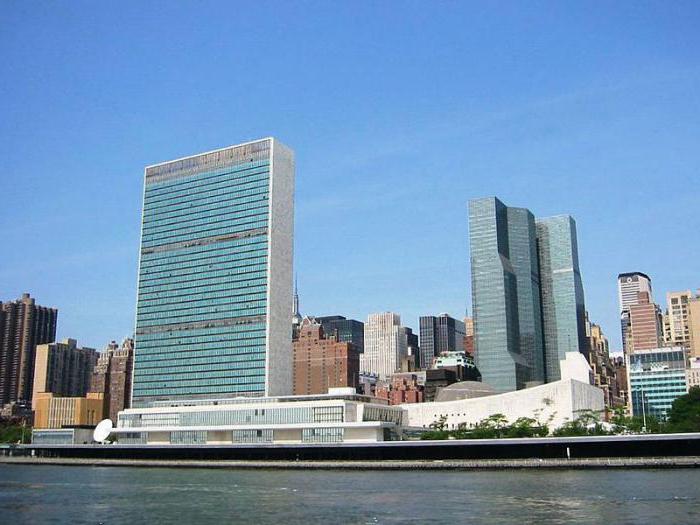
Trusteeship Council - a body that monitors controlled territories. As of today, the activities of the body have been abolished.
UN countries
The organization currently has 193 members.Among the UN countries there are: Russia, the USA, Italy, Yugoslavia, Ukraine and many others. Many can be represented on a regular basis, others permanently. Among the permanent participants of the UN are Russia, France, China, and the USA.
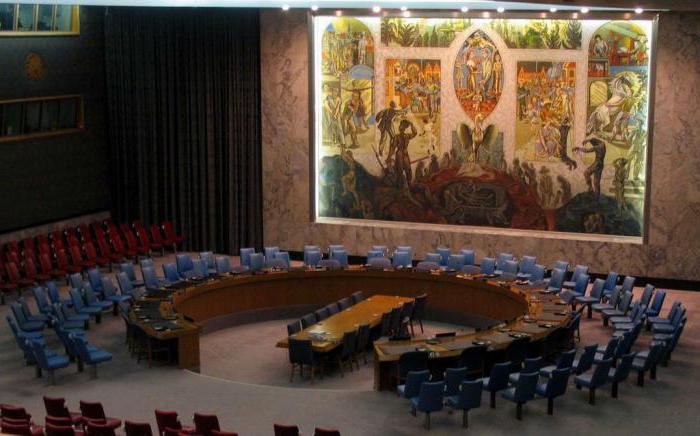
Over the years, a growing number of states have been part of the UN. Directly in 1945 were included:
- Australia.
- Belgium.
- Great Britain.
- PRC.
- Poland.
- USA and others.
In the 90s, the UN was replenished with several more members:
- DPRK
- Korea.
- Kazakhstan.
- Turkmenistan
- Armenia.
- Latvia and others.
In the 2000s, only 5 countries entered. UN membership replenished:
- Tuvalu.
- Yugoslavia.
- Switzerland.
- East Timor.
- Montenegro
The last member in July 2011 was South Sudan.
Main languages
For the effective work of the organization, six main languages adopted in the charter were established: Russian, Chinese, English, French, Arabic and Spanish.
All of the above languages are officially approved. In the case of a speech of the organization’s participants in a language that is not on the list, translation must be provided in written or oral form.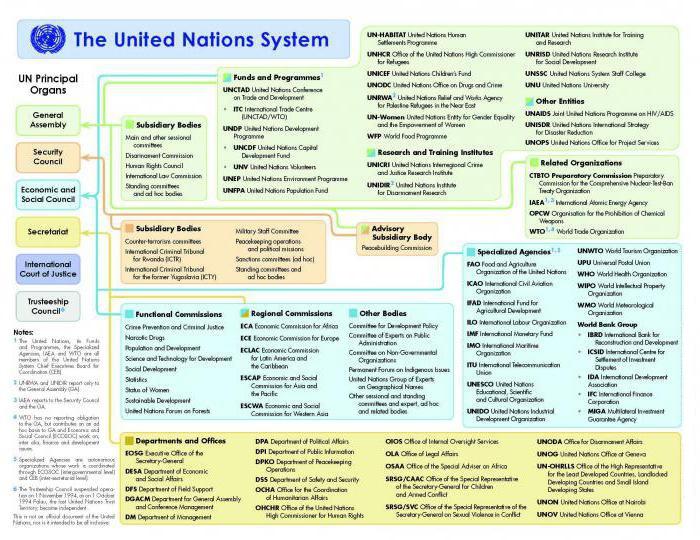
Charter
The organization’s charter was a unique treaty, obliging countries to respect and respect the freedoms and rights of people. The main concepts laid down in the charter:
- equality of all its participants;
- 100% peaceful settlement of disputes and conflicts;
- non-interference by the organization in the internal activities of a single state.
Peacekeeping
The most important task of the organization is to maintain peace between the countries that make up. The main instrument in achieving the goals are peace operations. Main questions:
- humanitarian assistance to countries;
- continuous ceasefire observation missions;
- law enforcement assistance.
Most famous mission is a mission to resolve the conflict between Israel and Palestine. The cause of the conflict is a dispute over territory in the Gaza Strip and the Jordan River. The effectiveness of such missions is quite controversial and has its opponents and supporters. For example, the Palestinian-Israeli conflict continues today.
Criticism of the world community
Very often, the United Nations is criticized because of the low efficiency of its work, the presence of corruption at the international level, biased attitude towards third world countries, unjustified funding, recorded facts of violent activities during operations by peacekeepers, including over children, and the death of a peaceful population, lack of reactions from human rights organizations. The resonance scandal in the UN case was the incident when the peacekeeping mission specially provoked the island Haiti is an epidemic of a dangerous infectious disease that claimed the lives of many thousands of inhabitants of the island. Despite a letter from human rights organizations to the current secretary, the UN has not made any attempts to localize and eliminate the consequences of the epidemic.
Along with the negative aspects of the organization, there are also positive ones. For example, humanitarian assistance to countries affected by natural disasters, such as devastating earthquakes, floods, droughts and their consequences.